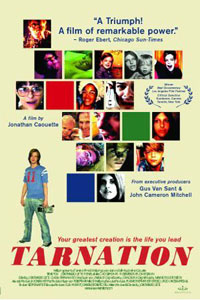Film Reviews
 Tarnation (2003)
Tarnation (2003)
"We're all just one happy family," insists grandfather Adolph, "and we all love God." How and why that tragic falsehood got perpetuated in his horribly dysfunctional family is the subject of Jonathan Caouette's intense, emotionally raw, and deeply sad autobiographical documentary. His mother Renee—for all her madness, mental illness, 200 shock therapy treatments as a child, drug abuse, rape, and over a hundred psychiatric hospitalizations from 1965 to 1999, knows better: "Screwed up parents raise screwed up kids. I just wanted to break the cycle." She did not and could not, and her son Jonathan, writer and director, has paid a horrible psychic price: ''I don't want to be like my mom," he frets in a final scene. But he repeated the past and more, including growing up gay in Texas, and developing a "depersonalization disorder" in which one views one's life in a detached, third person manner as if in a dream.
Caouette incorporates numerous media into his cinematic catharsis —super 8 home movies that he started taking when he was 11, still photos, phone messages, movie clips, tape recordings, and even simple text. He fires these at the viewer in a non-linear fashion and at a staccato pace, often filling split screens with dozens of overlapping frames. The disorienting effect mimics his life, and even draws the viewer into his own state of mind. Caouette is a gifted film maker. As a human being he gets high marks for sheer bravery for confronting his horrific past, and for his deep tenderness toward his deranged mother who came to live with him in New York City. No person should bear even a fraction of the curse that he inherited. Tarnation makes at least two claims to fame. It has won a place as one of the "Top Ten Films of the Year" on over 50 such lists, and was reputedly made for $218 on a Macintosh and edited with the bundled iMovie software.


